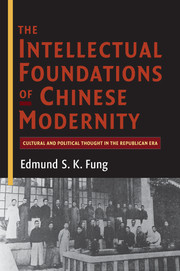 The Intellectual Foundations of Chinese Modernity
The Intellectual Foundations of Chinese Modernity Published online by Cambridge University Press: 03 May 2010
On his visit to China in 1920, Bertrand Russell observed that the students and most of the best among their teachers whom he met at universities in Beijing and Nanjing were, to a man, socialists. Russell may have hazy ideas about what sort of socialists they were, but he was correct in feeling a Chinese impulse towards socialism. A belief in socialism of one variety or another was shared across the political spectrum. Indeed, since the 1920s, socialism had become the mainstream of Chinese political thought. This prompted the political scientist Qian Duansheng to write in a 1950 overview of politics in the Nationalist era that the political parties and groups of every stripe were ‘all democratic’ and ‘all tend to be socialistic’ with regard to their professed principles.
There were two major strands of socialist thought in the Republican era. One was radical Marxism, represented by such protagonists as Chen Duxiu and Li Dazhao and perfected by Mao Zedong. The other was reformist or democratic socialism, inspired by the socialist movements in Western Europe in the interwar years, especially in Weimar Germany and England. Each represented a road to modernity, one revolutionary and the other evolutionary.
Reformist socialist thought illustrates the interrelatedness of the liberal, conservative and socialist triad of modern Chinese thought. Prior to the May Fourth period, reformers and cultural conservatives were already critical of capitalism and laissez-faire economics, speaking about socialism of a moderate variety with a view to bringing about social reform.
To save this book to your Kindle, first ensure no-reply@cambridge.org is added to your Approved Personal Document E-mail List under your Personal Document Settings on the Manage Your Content and Devices page of your Amazon account. Then enter the ‘name’ part of your Kindle email address below. Find out more about saving to your Kindle.
Note you can select to save to either the @free.kindle.com or @kindle.com variations. ‘@free.kindle.com’ emails are free but can only be saved to your device when it is connected to wi-fi. ‘@kindle.com’ emails can be delivered even when you are not connected to wi-fi, but note that service fees apply.
Find out more about the Kindle Personal Document Service.
To save content items to your account, please confirm that you agree to abide by our usage policies. If this is the first time you use this feature, you will be asked to authorise Cambridge Core to connect with your account. Find out more about saving content to Dropbox.
To save content items to your account, please confirm that you agree to abide by our usage policies. If this is the first time you use this feature, you will be asked to authorise Cambridge Core to connect with your account. Find out more about saving content to Google Drive.